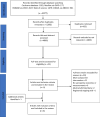The evidence and impact of deprescribing on sarcopenia parameters: a systematic review
- PMID: 40055633
- PMCID: PMC11887267
- DOI: 10.1186/s12877-025-05819-7
The evidence and impact of deprescribing on sarcopenia parameters: a systematic review
Abstract
Background: Polypharmacy (concomitant prescription of ≥ 5 medications) affects a third of older people, and evidence suggests an association with sarcopenia (loss of skeletal muscle mass/quality, muscle strength, and/or physical performance). As such, deprescribing has been recommended in routine management of sarcopenia, however it's unknown whether deprescribing is beneficial. This systematic review aimed to understand effects of deprescribing on sarcopenia parameters in older adults.
Methods: Medline, Embase, CINAHL, Web of Science, and the Cochrane Library databases were searched up to July 2023. All studies reporting effects of deprescribing interventions on sarcopenia parameters (primary outcomes) or nutritional intake (secondary outcomes) among older adults were included. Findings were summarised narratively, and study quality was assessed.
Results: A total of 4860 articles were identified and six were included (mean age range 67-87 years). Studies were heterogeneous in design, settings, follow-up periods, and outcomes. Deprescribing had no effect on skeletal muscle mass (n = 2). Positive effects were shown on handgrip strength with two studies reporting improvements following antihypertensive or benzodiazepines discontinuation and one showing no change between admission and discharge with general deprescribing. Outcomes of deprescribing on physical function outcomes varied based on the measures used. For example, one study showed no changes in timed up and go, Whereas effects on gait speed was contradictory in two studies, with preservation and deterioration reported. Two studies reported improvement between baseline and follow up in balance scores measured part of the Short physical performance battery or using the Short Berg's Balance Scale among those who discontinued antihypertensive and/or benzodiazepines. Two studies reported improvements in nutritional outcomes following deprescribing at hospital discharge, whereas two other studies reported no change or increase in weight loss.
Conclusion: There is limited research about the impact of deprescribing on sarcopenia parameters. This systematic review found no significant changes in muscle mass but there is some evidence in improvements in strength, physical performance, and nutritional status with deprescribing. The multidisciplinary implementation of nutrition and exercise therapies, as well as medication management to modify polypharmacy, may further promote improvement in sarcopenia. However, more high-quality research is needed to understand the effects of deprescribing on sarcopenia parameters among older people including those with confirmed diagnosis of sarcopenia.
Registration: The review was registered on the international prospective register of systematic reviews (PROSPERO, CRD42023417997).
Keywords: Deprescribing; Muscle function; Muscle mass; Muscle strength; Outcomes; Sarcopenia.
© 2025. The Author(s).
Conflict of interest statement
Declarations. Ethics approval and consent to participate: This is a systematic review of published studies, and no additional consent is required. Consent for publication: Not applicable. Competing interests: The authors declare no competing interests.
Figures
References
-
- Gnjidic D, Hilmer SN. Use of potentially inappropriate medications in the care of frail older people. Aging Health. 2010;6(6):705–16.
Publication types
MeSH terms
LinkOut - more resources
Full Text Sources
Research Materials


